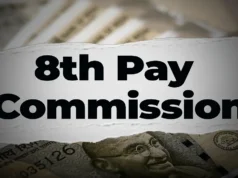March 15 Deadline for Payment of Advance Tax:- Advance tax should be paid timely so that penalties and charges of interest are not incurred from the Income Tax Department. Payment of advance tax for the financial year 2024-25 should be made on March 15, 2025. If you do not meet this due date, you might have to pay financial penalties and charges of interest.
Key Facts about Advance Tax Payment
| Detail | Information |
|---|---|
| Deadline | March 15, 2025 |
| Who Must Pay? | Individuals, businesses, and professionals owing taxes of more than ₹10,000 |
| Penalty for Late Payment | Interest under Sections 234B & 234C |
| Interest Rate | 1% monthly on unpaid tax |
| Who is Exempt? | Senior citizens older than 60 with no income from businesses |
| Payment Mode | Online (Net Banking, UPI, Debit/Credit Card, Challan 280) |
| Where to Pay? | Through the website of the Income Tax Department |
Pre-payment of taxes before the due date exempts you from the imposition of charges of interest under Sections 234B and 234C. With accurate estimation of income and following the payment schedule, you can be in compliance with taxation regulations and avoid undue financial stress.
What is Advance Tax?
Advance tax is a way of paying taxes in installments throughout the year instead of making one large payment at the end of the financial year. It is also known as “pay-as-you-earn tax.”
Who Needs to Pay Advance Tax?
You have to pay advance tax if your total tax liability for the year is more than ₹10,000. This is applicable to:
- Salary earners (where their TDS is not enough to cover the full tax liability)
- Self-employed professionals (doctors, freelancers, lawyers, etc.)
- Businesses (both small and large companies)
- Traders & investors (who earn their income from stocks, mutual funds, properties, etc.)
Who is Exempt from Advance Tax?
- Senior citizens (60 years and older) with no income from businesses
- Taxpayers with total tax liability after TDS deductions of less than ₹10,000
Advance Tax Payment Schedule
| Due Date | Tax to Be Paid |
|---|---|
| June 15 | 15% of total tax liability |
| September 15 | 45% of total tax liability |
| December 15 | 75% of total tax liability |
| March 15 | 100% of total tax liability |
Penalties for Late Payment
You may have to pay penalties and interest if you are late with the advance tax.
- Section 234B: 1% per month interest if 90% of your total tax is not remitted until March 31.
- Section 234C: 1% interest for each default installment payment.
How to Calculate Advance Tax
- Compute Your Total Income – Include salary income, income from business, investments, rental income, etc.
- Deduct Eligible Expenses & Deductions – Use tax-saving benefits under Sections 80C, 80D, and 10(14).
- Calculate Taxable Income – Utilize the latest income tax slabs.
- Compute Final Tax Liability – Subtract TDS from your taxable amount.
- Advance Tax Payment – Pay as per schedule if the amount is greater than ₹10,000.
How to Pay Advance Tax Online?
You can simply pay advance tax through the Income Tax e-Filing portal:
- Go to the Income Tax e-Filing website.
- Click on e-Pay Tax.
- Enter your PAN and phone number.
- Select Advance Tax as the mode of payment.
- Choose your payment method (Debit Card, UPI, or Net Banking).
- Download Challan 280 as proof of payment.
Alternatively, you can also pay offline using Challan 280 at the prescribed bank branches.
Also Read:- Salary Hike for Primary Teachers: What to Expect from the 8th Pay Commission
Why Should You Pay Advance Tax on Time?
- Prevents Interest & Penalties – Saves one from undue financial burden.
- Enhanced Tax Planning – Enables effective management of investments and finances.
- Eliminates End-of-Year Rush – No last-minute rushing to raise funds at year-end.
- Enhances Credibility of Funds – Exemplifies compliant tax conduct.
Mistakes to Steer Clear Of
- Leaving Out Other Sources of Income – Don’t overlook rental income, capital gains, or income from interest.
- Missing Installment Payments – Partial payments also reduce interest liability.
- Not Saving Payment Receipts – Preserve your challan and internet payment receipts for future purposes.
- Oversight of Tax Deductions – Make use of provisions under Sections 80C, 80D, and HRA to lower tax liability.
- Blending TDS with Advance Tax – Ensure that your TDS deductions are adjusted while computing advance tax.
Frequently Asked Questions (FAQs)
1. What happens if I miss the March 15 deadline?
You have to pay 1% of the unpaid amount as monthly interest under Section 234B.
2. How can I tell if I have to pay advance tax?
You have to pay advance tax if your total tax liability after TDS is more than ₹10,000.
3. Can I revise my advance tax payment if I made an error?
Yes, you can pay additional tax in the following installment if you make a mistake.
4. Do NRIs have to pay advance tax?
Yes, NRIs with taxable income in India exceeding ₹10,000 must pay advance tax.
5. What if I overpay my advance tax?
In case of any overpayment, you can claim a refund at the time of filing ITR or carry forward the excess amount in the following financial year.
6. Can I pay advance tax offline?
Yes, you may pay through Challan 280 at any designated bank branch.
Final Thoughts
The due date for payment of advance tax for the financial year 2024-25 is March 15. Payment on time avoids charges of interest and penalties. With proper estimation of your taxes, payment in installments, and knowledge of deductions, you can be compliant and stress-free. Pay in time and plan in advance to avoid any undue financial pressures.










